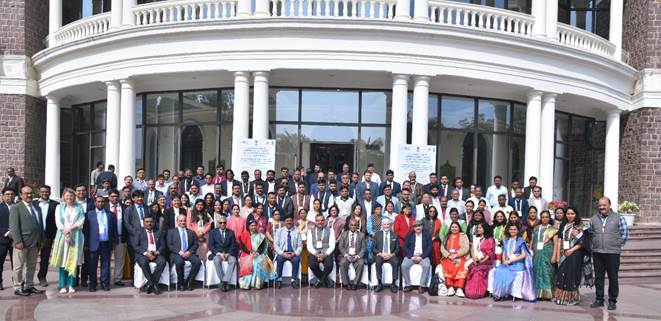India Strengthens SDGs with Focus on Environment and Gender at Capacity-Building Workshop
Two-day workshop highlights advancements in environmental accounting and gender statistics, fostering collaboration for sustainable and inclusive growth.

The second day of the “Capacity Building Workshop on Monitoring Frameworks of Sustainable Development Goals (SDGs), Compilation of Environment Accounts, and Gender Statistics” provided profound insights into the critical pillars of sustainability—environmental frameworks and gender statistics.
Advancing Environmental Economic Accounting
The workshop emphasized India’s growing expertise in environmental economic accounting, showcasing the importance of state-level initiatives in shaping sustainable progress. Discussions featured best practices from Telangana, Himachal Pradesh, and Uttarakhand, such as:
- National Forest Inventory: Implementing an innovative grid-based design to monitor forest resources.
- Sustainable Environment Performance Index (SEPI): A tool to measure environmental sustainability.
- Gross Environment Product (GEP): A state-level metric quantifying ecological contributions.
The United Nations Development Programme (UNDP) stressed the need to harmonize people, planet, and profits through sustainable management systems. Participants explored the balance between economic growth and ecological sustainability, with shared learnings driving a collaborative vision for environmental well-being.
Transforming Gender Statistics
The session on gender statistics highlighted the pivotal role of gender-disaggregated data in achieving equity and equality. Presentations from NFHS-5 (National Family Health Survey) showcased advancements in data collection, improved tools, and increased dimensions, revealing significant progress in:
- Maternal Health: Enhanced access to healthcare for women.
- Contraceptive Use: Marked improvements across regions.
UN Women introduced innovative tools like the Women Empowerment Index (WEI) and the Global Gender Parity Index (GGPI) for targeted interventions. State-level innovations included:
- Kerala’s Gender Data Hub: Pioneering a centralized platform for gender statistics.
- Nagaland’s Gender Statistics Database: An innovative resource to inform policy decisions.
States like Tamil Nadu and Kerala shared their achievements in integrating gender-sensitive SDG monitoring, fostering a shared vision for inclusive development.
Key Takeaways and Future Directions
Shri N K Santoshi, Director General (Central Statistics), Ministry of Statistics and Programme Implementation (MoSPI), emphasized the importance of peer learning in advancing environmental accounting and gender statistics. The closing session summarized key findings and outlined actionable steps forward:
- Multi-stakeholder partnerships: Encouraging collaboration between states, central ministries, and international organizations.
- Policy integration: Aligning SDG monitoring frameworks with national priorities.
- Capacity building: Strengthening data collection mechanisms and fostering technical expertise.
Collaboration and Support
The workshop’s success was bolstered by the Government of Madhya Pradesh, which provided logistical and resource mobilization support. The UNDP’s technical expertise played a pivotal role in shaping impactful discussions.
The Ministry of Statistics and Programme Implementation (MoSPI) reiterated its commitment to sustainability, equity, and inclusivity, vowing to organize similar capacity-building workshops in the future.
This workshop marks a significant step in India’s journey to achieve sustainable development goals, emphasizing the integration of environmental and gender frameworks into national policy and governance.
- READ MORE ON:
- Sustainable Development Goals










